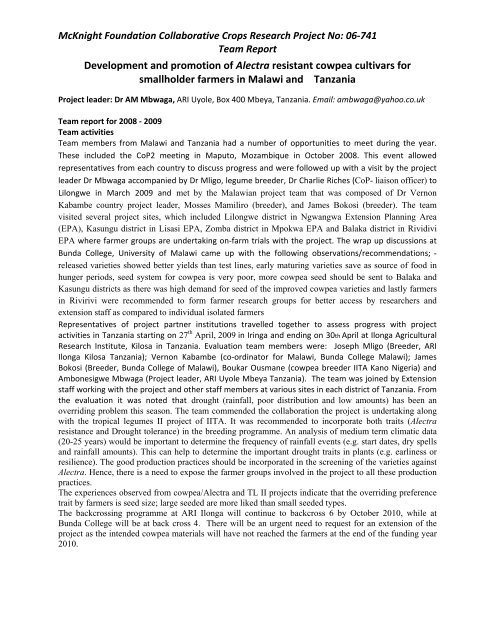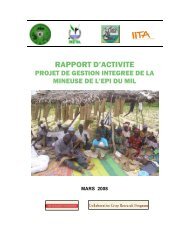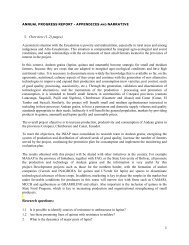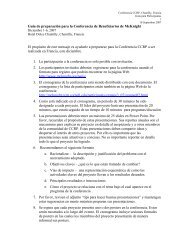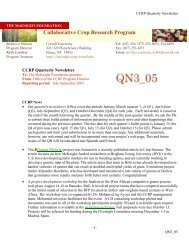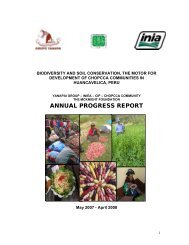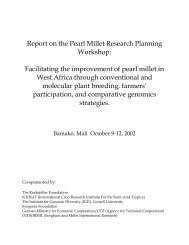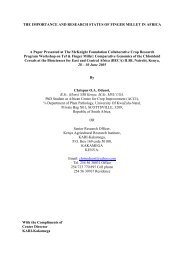English - McKnight Foundation Collaborative Crop Research Program
English - McKnight Foundation Collaborative Crop Research Program
English - McKnight Foundation Collaborative Crop Research Program
Create successful ePaper yourself
Turn your PDF publications into a flip-book with our unique Google optimized e-Paper software.
<strong>McKnight</strong> <strong>Foundation</strong> <strong>Collaborative</strong> <strong>Crop</strong>s <strong>Research</strong> Project No: 06‐741<br />
Team Report<br />
Development and promotion of Alectra resistant cowpea cultivars for<br />
smallholder farmers in Malawi and Tanzania<br />
Project leader: Dr AM Mbwaga, ARI Uyole, Box 400 Mbeya, Tanzania. Email: ambwaga@yahoo.co.uk<br />
Team report for 2008 ‐ 2009<br />
Team activities<br />
Team members from Malawi and Tanzania had a number of opportunities to meet during the year.<br />
These included the CoP2 meeting in Maputo, Mozambique in October 2008. This event allowed<br />
representatives from each country to discuss progress and were followed up with a visit by the project<br />
leader Dr Mbwaga accompanied by Dr Mligo, legume breeder, Dr Charlie Riches (CoP- liaison officer) to<br />
Lilongwe in March 2009 and met by the Malawian project team that was composed of Dr Vernon<br />
Kabambe country project leader, Mosses Mamiliro (breeder), and James Bokosi (breeder). The team<br />
visited several project sites, which included Lilongwe district in Ngwangwa Extension Planning Area<br />
(EPA), Kasungu district in Lisasi EPA, Zomba district in Mpokwa EPA and Balaka district in Rividivi<br />
EPA where farmer groups are undertaking on‐farm trials with the project. The wrap up discussions at<br />
Bunda College, University of Malawi came up with the following observations/recommendations; -<br />
released varieties showed better yields than test lines, early maturing varieties save as source of food in<br />
hunger periods, seed system for cowpea is very poor, more cowpea seed should be sent to Balaka and<br />
Kasungu districts as there was high demand for seed of the improved cowpea varieties and lastly farmers<br />
in Rivirivi were recommended to form farmer research groups for better access by researchers and<br />
extension staff as compared to individual isolated farmers<br />
Representatives of project partner institutions travelled together to assess progress with project<br />
activities in Tanzania starting on 27 th April, 2009 in Iringa and ending on 30th April at Ilonga Agricultural<br />
<strong>Research</strong> Institute, Kilosa in Tanzania. Evaluation team members were: Joseph Mligo (Breeder, ARI<br />
Ilonga Kilosa Tanzania); Vernon Kabambe (co‐ordinator for Malawi, Bunda College Malawi); James<br />
Bokosi (Breeder, Bunda College of Malawi), Boukar Ousmane (cowpea breeder IITA Kano Nigeria) and<br />
Ambonesigwe Mbwaga (Project leader, ARI Uyole Mbeya Tanzania). The team was joined by Extension<br />
staff working with the project and other staff members at various sites in each district of Tanzania. From<br />
the evaluation it was noted that drought (rainfall, poor distribution and low amounts) has been an<br />
overriding problem this season. The team commended the collaboration the project is undertaking along<br />
with the tropical legumes II project of IITA. It was recommended to incorporate both traits (Alectra<br />
resistance and Drought tolerance) in the breeding programme. An analysis of medium term climatic data<br />
(20-25 years) would be important to determine the frequency of rainfall events (e.g. start dates, dry spells<br />
and rainfall amounts). This can help to determine the important drought traits in plants (e.g. earliness or<br />
resilience). The good production practices should be incorporated in the screening of the varieties against<br />
Alectra. Hence, there is a need to expose the farmer groups involved in the project to all these production<br />
practices.<br />
The experiences observed from cowpea/Alectra and TL II projects indicate that the overriding preference<br />
trait by farmers is seed size; large seeded are more liked than small seeded types.<br />
The backcrossing programme at ARI Ilonga will continue to backcross 6 by October 2010, while at<br />
Bunda College will be at back cross 4. There will be an urgent need to request for an extension of the<br />
project as the intended cowpea materials will have not reached the farmers at the end of the funding year<br />
2010.


